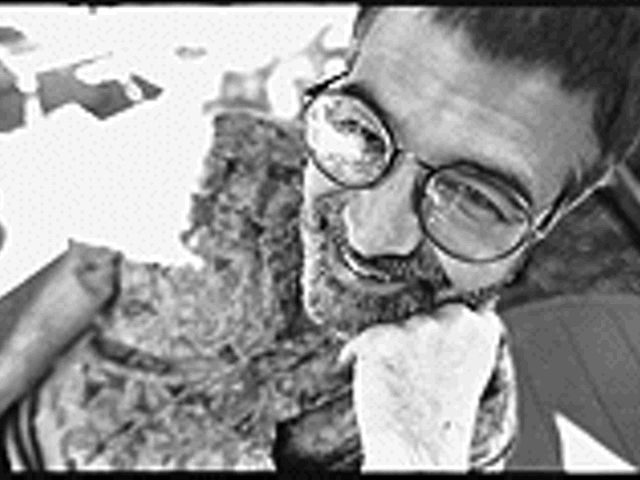When Jeffrey meets Steve, a serenely self-confident bartender at the gym, it's definitely true lust, and it may even be true love. But how can Jeffrey go back on his pledge? It's bad enough when love hurts, but when it kills In short: Boy meets boy, boy loses boy, boy experiences a variety of maturation experiences (as well as some pretty hilarious dream sequences) before boy can get boy again. Comedy and tragedy are fused, and the gamut of human emotions pulse beneath relentless jocularity. Jeffrey has a fleeting grasp on his situation during the soliloquies that punctuate the play. "Sex wasn't meant to be safe, negotiated or fatal," he declares early on. Jeffrey turns on the hero's transition from fear and defiance to a genuine, if tentative, acceptance of life's joys and terrors. In the end, Jeffrey's willingness to woo Steve, AIDS or not, is a moral triumph.
HotHouse Theatre's production is both spirited and engaging, with some notable cameos and some zippy staging, including a bed inspired by the Trojan horse (the war, not the prophylactic, though the subtextual pun is welcome). On the way to an uplifting payoff, this antic work features fantasy characters such as a televangelist, a game-show host and Mother Teresa.
The genius and potential unplayability of the title role is that Jeffrey is, well, a pretty ordinary guy. Head and heart, spirit and libido seldom, if ever, operate in unison. And the hunky Steve leaves him as sputtering and incapable of mature self-expression as any straight 10th-grader on whom the class beauty has smiled. His neuroses are Everyman's. Actor Jason Cannon, who has the loopy good looks of Steve Guttenberg, handles his vacillating cluelessness with skill if not great warmth. He's better when reacting, and his scenes with Steve (the charismatic Michael Briggs) have a convincing tension. Of course, the bravura role is Sterling (memorably played by Patrick Stewart in the film). Here, Walter Marts, a trim and compact actor, has dignity but no particular depth. Yet he and Aaron Allen, who plays cheerily complacent Darius (he adores his penthouse life as much as yowling "Memory" every night), have a memorably affectionate cohesion. The remainder of the company is called on to play a Yellow Pages' worth of cameos, ranging from a preoperative lesbian transsexual to a priapic priest; playwright Rudnick's enthusiasm for these comic vignettes that explore the cultural terrain of gay life have more energy than many high-drama moments and provide dynamite material for comic actors Todd Schaefer, Ted Cancila and David Cooperstein. All have extremely mobile faces, across which disdain or confusion pass as easily as sly humor. Karin Hansen, the lone female in the cast, is best as sadistically gleeful televangelist Debra Moorehouse, but she needs to slow down her geriatric shuffle as Mother Teresa and get the accent consistent for Jeffrey's Wisconsin mom.
Part of the enjoyment of this production is what Jeffrey most fears: intimacy. HotHouse occupies a downtown storefront, and the playing area faces fewer than 10 rows of seats. Scenic designer Gene Fuller has built a versatile set: platforms, stairs and even a deus ex machina lift. Playwright Rudnick has taken a hint from the playwrights of antiquity and spared us a deathbed scene. But the subsequent apotheosis is played on the highest platform, one of the few times real distance is built in to the relationship between players and audience. Smart choices aside, unfortunately, the opening-night pacing was frequently off-balance. Director Marty Stanberry has used the playing space creatively, but missed lighting cues may have kept the actors on edge.
Jeffrey has a gently but profoundly theological undercurrent, which is thoroughly mislaid in the film thanks to the constraints of the format and Nathan Lane's sidesplitting but overplayed depiction of the priest who actually does explain the meaning of life: giving the Almighty a hand by embracing joy. But I'm short-shrifting elegant writing — Rudnick's script explores this passage further. It would have been marvelous if HotHouse Theatre had found a way to make this theme clearer, but this scene was directed far too broadly (which may be Rudnick's fault, because he can't resist the cheap shot), which minimized the effectiveness. The enemy in Jeffrey is not AIDS but despair, and the forfeiture of joy.





